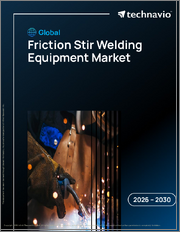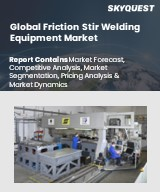
|
시장보고서
상품코드
1660998
마찰 교반 용접(FSW) 장비 시장 보고서 : 장비 유형, 최종 이용 산업, 지역별(2025-2033년)Friction Stir Welding Equipment Market Report by Equipment Type, End-Use Industry, and Region 2025-2033 |
||||||
세계의 마찰 교반 용접(FSW) 장비 시장 규모는 2024년에 2억 3,990만 달러에 달했습니다. 향후 IMARC 그룹은 시장이 2033년까지 3억 8,930만 달러에 이르며, 2025-2033년까지 성장률(CAGR)은 5.25%가 될 것으로 예측했습니다.
마찰 교반 용접(FSW)은 재료를 녹이지 않고 두 공작물의 용접을 지원하는 고체 용접 기술을 말합니다. 마찰열을 이용하여 재료를 연화시키고, 회전하면서 워크피스의 계면에 돌입해, 그 안을 이동하는 소모품이 없는 툴을 사용합니다. 플럭스, 용가재, 차폐 가스를 필요로 하지 않고 다른 용접 기술과 유사한 외관의 용접부를 형성하기 때문에 비용 절감과 경량화라는 독자적인 이점이 있습니다.
마찰 교반 용접(FSW) 장비 시장 경향:
시장은 건강과 환경에 미치는 영향이 제한적이며, 공정의 견고성이 향상되고, 인장 강도와 피로 저항 등의 기계적 특성이 개선되는 등 다양한 제품의 이점으로 인해 현재 성장하고 있습니다. 또한 사용시 보호 분위기가 필요하지 않습니다. 또한, 기공 폐쇄가 가능하기 때문에 예방 보전(PM) 부품의 용접에 매우 적합하며, 기공이 없는 용접 계면과 세련된 미세 구조를 얻을 수 있습니다. 이와는 별도로, 용접 영역 내의 격렬한 변형에 의해 입자 상에 증착된 산화막을 파괴하는 데에도 효과적입니다. 또한, FSW 장비의 응용은 다양한 산업에서 확대되고 있습니다. 예를 들어, 알루미늄 기반 섀시에 대한 수요가 증가하고 자동차 경량화에 대한 관심이 높아짐에 따라 자동차 분야에서 채택되고 있습니다. 리어 액슬, 드라이브 샤프트, 범퍼 빔, 리어 스포일러, 크래시 박스와 같은 자동차의 알루미늄 부품은 FSW 장비를 사용하여 용접할 수 있습니다. 이 외에 항공우주산업에서는 항공우주 부품의 경량화와 전체적인 연료소비 절감을 위해 이용되고 있습니다.
이 보고서에서 다루는 주요 질문
- 2024년의 마찰 교반 용접(FSW) 장비 시장 세계 시장 규모는?
- 세계 마찰 교반 용접(FSW) 장비 시장을 견인하는 주요 요인은?
- 세계 마찰 교반 용접(FSW) 장비 시장에 대한 COVID-19의 영향은?
- 세계 마찰 교반 용접(FSW) 장비 시장의 기기 유형별 내역은?
- 세계 마찰 교반 용접(FSW) 장비 시장의 최종 이용 산업별 내역은?
- 세계 마찰 교반 용접(FSW) 장비 시장의 주요 지역은?
- 세계 마찰 교반 용접(FSW) 장비 시장에서 주요 기업은?
목차
제1장 서문
제2장 조사 범위와 조사 방법
- 조사의 목적
- 이해관계자
- 데이터 소스
- 1차 정보
- 2차 정보
- 시장 추정
- 상향식 접근
- 하향식 접근
- 조사 방법
제3장 주요 요약
제4장 소개
- 개요
- 주요 업계 동향
제5장 세계의 마찰 교반 용접(FSW) 장비 시장
- 시장 개요
- 시장 실적
- COVID-19의 영향
- 시장 예측
제6장 시장 분석 : 기기종별
- 이동식 마찰 교반 용접(FSW) 장비
- 시장 동향
- 시장 예측
- 고정식 마찰 교반 용접(FSW) 장비
- 시장 동향
- 시장 예측
- 기타
- 시장 동향
- 시장 예측
제7장 시장 내역: 최종 이용 산업별
- 자동차산업
- 시장 동향
- 시장 예측
- 항공우주산업
- 시장 동향
- 시장 예측
- 철도산업
- 시장 동향
- 시장 예측
- 조선업
- 시장 동향
- 시장 예측
- 기타
- 시장 동향
- 시장 예측
제8장 시장 분석 : 지역별
- 북미
- 미국
- 캐나다
- 아시아태평양
- 중국
- 일본
- 인도
- 한국
- 호주
- 인도네시아
- 기타
- 유럽
- 독일
- 프랑스
- 영국
- 이탈리아
- 스페인
- 러시아
- 기타
- 라틴아메리카
- 브라질
- 멕시코
- 기타
- 중동 및 아프리카
- 시장 동향
- 시장 분석 : 국가별
- 시장 예측
제9장 SWOT 분석
- 개요
- 강점
- 약점
- 기회
- 위협
제10장 밸류체인 분석
제11장 Porter's Five Forces 분석
- 개요
- 구매자의 협상력
- 공급기업의 협상력
- 경쟁도
- 신규 참가업체의 위협
- 대체품의 위협
제12장 가격 지표
제13장 경쟁 구도
- 시장 구조
- 주요 기업
- 주요 기업 프로파일
- Beijing FSW Technology Co. Ltd.
- Colfax Corporation
- Fooke GmbH
- Gatwick Technologies Ltd.
- General Tool Company
- Grenzebach Maschinenbau GmbH
- Hitachi High-Tech Corporation
- KUKA Systems GmbH(Midea Group Co. Ltd.)
- Manufacturing Technology Inc.
- Par Systems LLC(Pohlad Companies)
The global friction stir welding equipment market size reached USD 239.9 Million in 2024. Looking forward, IMARC Group expects the market to reach USD 389.3 Million by 2033, exhibiting a growth rate (CAGR) of 5.25% during 2025-2033.
Friction stir welding (FSW) refers to a solid-state welding technique that assists in joining two workpieces without melting the material. It relies on a non-consumable tool that rotates and plunges into the interface of the workpiece and then moves through it by using frictional heat that softens the material. It forms a joint similar in appearance to other welding techniques without the requirement of flux, filler metal or shielding gas and thus offers the unique advantages of cost-savings and weight reduction.
Friction Stir Welding Equipment Market Trends:
The market is currently experiencing growth on account of various product advantages, including the limited impact on health and the environment, and improved process robustness and mechanical properties like tensile strength and fatigue resistance. Moreover, it does not need a protective atmosphere for utilization. It is also highly suitable for welding preventive maintenance (PM) parts as it enables pore closure, which leads to a pore-free weld interface and a refined microstructure. Apart from this, it is useful in breaking down the oxide layer deposited on the particles by intense deformation within the weld region. Furthermore, the application of FSW equipment is expanding across different industries. For instance, it is employed in the automotive sector on account of the escalating demand for aluminum-based chassis and the increasing focus on reducing the weight of vehicles. Aluminum components in a car, such as rear axles, driveshafts, bumper beams, rear spoilers, and crash boxes, can be welded using the FSW equipment. Besides this, it is utilized in the aerospace industry to reduce the weight of the aerospace components and overall fuel consumption.
Key Market Segmentation:
Breakup by Equipment Type:
- Mobile Friction Stir Welding Equipment
- Fixed Friction Stir Welding Equipment
- Others
Breakup by End-Use Industry:
- Automotive Industry
- Aerospace Industry
- Railway Industry
- Shipbuilding Industry
- Others
Breakup by Region:
- North America
- United States
- Canada
- Asia Pacific
- China
- Japan
- India
- South Korea
- Australia
- Indonesia
- Others
- Europe
- Germany
- France
- United Kingdom
- Italy
- Spain
- Russia
- Others
- Latin America
- Brazil
- Mexico
- Others
- Middle East and Africa
Competitive Landscape:
The report has also analysed the competitive landscape of the market with some of the key players being Beijing FSW Technology Co. Ltd., Colfax Corporation, Fooke GmbH, Gatwick Technologies Ltd., General Tool Company, Grenzebach Maschinenbau GmbH, Hitachi High-Tech Corporation, KUKA Systems GmbH (Midea Group Co. Ltd.), Manufacturing Technology Inc., Par Systems LLC (Pohlad Companies), etc.
Key Questions Answered in This Report
- 1.What is the size of the global friction stir welding equipment market in 2024?
- 2.What are the key factors driving the global friction stir welding equipment market?
- 3.What has been the impact of COVID-19 on the global friction stir welding equipment market?
- 4.What is the breakup of the global friction stir welding equipment market based on the equipment type?
- 5.What is the breakup of the global friction stir welding equipment market based on the end-use industry?
- 6.What are the key regions in the global friction stir welding equipment market?
- 7.Who are the key players/companies in the global friction stir welding equipment market?
Table of Contents
1 Preface
2 Scope and Methodology
- 2.1 Objectives of the Study
- 2.2 Stakeholders
- 2.3 Data Sources
- 2.3.1 Primary Sources
- 2.3.2 Secondary Sources
- 2.4 Market Estimation
- 2.4.1 Bottom-Up Approach
- 2.4.2 Top-Down Approach
- 2.5 Forecasting Methodology
3 Executive Summary
4 Introduction
- 4.1 Overview
- 4.2 Key Industry Trends
5 Global Friction Stir Welding Equipment Market
- 5.1 Market Overview
- 5.2 Market Performance
- 5.3 Impact of COVID-19
- 5.4 Market Forecast
6 Market Breakup by Equipment Type
- 6.1 Mobile Friction Stir Welding Equipment
- 6.1.1 Market Trends
- 6.1.2 Market Forecast
- 6.2 Fixed Friction Stir Welding Equipment
- 6.2.1 Market Trends
- 6.2.2 Market Forecast
- 6.3 Others
- 6.3.1 Market Trends
- 6.3.2 Market Forecast
7 Market Breakup by End-Use Industry
- 7.1 Automotive Industry
- 7.1.1 Market Trends
- 7.1.2 Market Forecast
- 7.2 Aerospace Industry
- 7.2.1 Market Trends
- 7.2.2 Market Forecast
- 7.3 Railway Industry
- 7.3.1 Market Trends
- 7.3.2 Market Forecast
- 7.4 Shipbuilding Industry
- 7.4.1 Market Trends
- 7.4.2 Market Forecast
- 7.5 Others
- 7.5.1 Market Trends
- 7.5.2 Market Forecast
8 Market Breakup by Region
- 8.1 North America
- 8.1.1 United States
- 8.1.1.1 Market Trends
- 8.1.1.2 Market Forecast
- 8.1.2 Canada
- 8.1.2.1 Market Trends
- 8.1.2.2 Market Forecast
- 8.1.1 United States
- 8.2 Asia Pacific
- 8.2.1 China
- 8.2.1.1 Market Trends
- 8.2.1.2 Market Forecast
- 8.2.2 Japan
- 8.2.2.1 Market Trends
- 8.2.2.2 Market Forecast
- 8.2.3 India
- 8.2.3.1 Market Trends
- 8.2.3.2 Market Forecast
- 8.2.4 South Korea
- 8.2.4.1 Market Trends
- 8.2.4.2 Market Forecast
- 8.2.5 Australia
- 8.2.5.1 Market Trends
- 8.2.5.2 Market Forecast
- 8.2.6 Indonesia
- 8.2.6.1 Market Trends
- 8.2.6.2 Market Forecast
- 8.2.7 Others
- 8.2.7.1 Market Trends
- 8.2.7.2 Market Forecast
- 8.2.1 China
- 8.3 Europe
- 8.3.1 Germany
- 8.3.1.1 Market Trends
- 8.3.1.2 Market Forecast
- 8.3.2 France
- 8.3.2.1 Market Trends
- 8.3.2.2 Market Forecast
- 8.3.3 United Kingdom
- 8.3.3.1 Market Trends
- 8.3.3.2 Market Forecast
- 8.3.4 Italy
- 8.3.4.1 Market Trends
- 8.3.4.2 Market Forecast
- 8.3.5 Spain
- 8.3.5.1 Market Trends
- 8.3.5.2 Market Forecast
- 8.3.6 Russia
- 8.3.6.1 Market Trends
- 8.3.6.2 Market Forecast
- 8.3.7 Others
- 8.3.7.1 Market Trends
- 8.3.7.2 Market Forecast
- 8.3.1 Germany
- 8.4 Latin America
- 8.4.1 Brazil
- 8.4.1.1 Market Trends
- 8.4.1.2 Market Forecast
- 8.4.2 Mexico
- 8.4.2.1 Market Trends
- 8.4.2.2 Market Forecast
- 8.4.3 Others
- 8.4.3.1 Market Trends
- 8.4.3.2 Market Forecast
- 8.4.1 Brazil
- 8.5 Middle East and Africa
- 8.5.1 Market Trends
- 8.5.2 Market Breakup by Country
- 8.5.3 Market Forecast
9 SWOT Analysis
- 9.1 Overview
- 9.2 Strengths
- 9.3 Weaknesses
- 9.4 Opportunities
- 9.5 Threats
10 Value Chain Analysis
11 Porters Five Forces Analysis
- 11.1 Overview
- 11.2 Bargaining Power of Buyers
- 11.3 Bargaining Power of Suppliers
- 11.4 Degree of Competition
- 11.5 Threat of New Entrants
- 11.6 Threat of Substitutes
12 Price Indicators
13 Competitive Landscape
- 13.1 Market Structure
- 13.2 Key Players
- 13.3 Profiles of Key Players
- 13.3.1 Beijing FSW Technology Co. Ltd.
- 13.3.1.1 Company Overview
- 13.3.1.2 Product Portfolio
- 13.3.2 Colfax Corporation
- 13.3.2.1 Company Overview
- 13.3.2.2 Product Portfolio
- 13.3.2.3 Financials
- 13.3.2.4 SWOT Analysis
- 13.3.3 Fooke GmbH
- 13.3.3.1 Company Overview
- 13.3.3.2 Product Portfolio
- 13.3.3.3 Financials
- 13.3.4 Gatwick Technologies Ltd.
- 13.3.4.1 Company Overview
- 13.3.4.2 Product Portfolio
- 13.3.4.3 Financials
- 13.3.5 General Tool Company
- 13.3.5.1 Company Overview
- 13.3.5.2 Product Portfolio
- 13.3.6 Grenzebach Maschinenbau GmbH
- 13.3.6.1 Company Overview
- 13.3.6.2 Product Portfolio
- 13.3.6.3 Financials
- 13.3.7 Hitachi High-Tech Corporation
- 13.3.7.1 Company Overview
- 13.3.7.2 Product Portfolio
- 13.3.7.3 Financials
- 13.3.7.4 SWOT Analysis
- 13.3.8 KUKA Systems GmbH (Midea Group Co. Ltd.)
- 13.3.8.1 Company Overview
- 13.3.8.2 Product Portfolio
- 13.3.9 Manufacturing Technology Inc.
- 13.3.9.1 Company Overview
- 13.3.9.2 Product Portfolio
- 13.3.10 Par Systems LLC (Pohlad Companies)
- 13.3.10.1 Company Overview
- 13.3.10.2 Product Portfolio
- 13.3.10.3 Financials
- 13.3.1 Beijing FSW Technology Co. Ltd.















